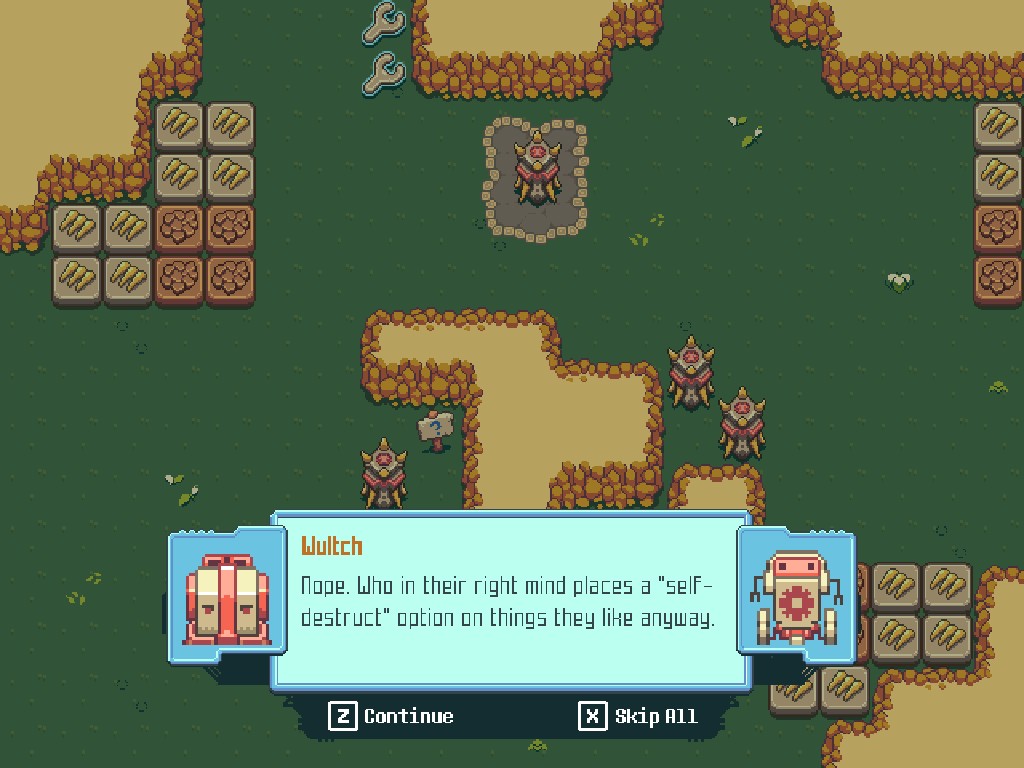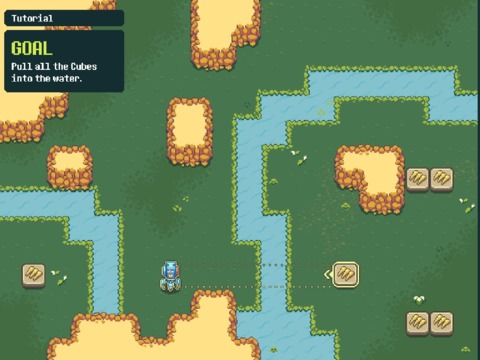During the past few years, developers have twisted the conventions of classic games to make unique, exciting new games. Super Meat Boy, Fez, and even Braid focus on the kinds of tropes and mechanics common in the days of Sonic and Mario. Cubetractor fits nicely under the label of modern games designed with sentimentality in mind, but with that pining focus the game brings creative mechanics and difficult puzzles that are hidden behind a veneer of unassuming innocence.

Cubetractor's core is based on attracting cubes, and the subtleties and technical execution challenges that surround the strange premise are the meat of this adventure. You play as Endroi, a robotic drone who seems to take strange delight in completing puzzles and frustrating the plans of his creators in a comically overblown fashion. He has been built with the ability to target and pull specific kinds of cubes, and his motivations aren't loaded down with the weight of excessive postmodernity or even the classic "rescue the princess" narrative. Instead, Endroi's motivations amount to little more than the joy of exploration.
Unfortunately for you, Endroi's world is anything but friendly. The first few missions consist of deceptively simple tutorials, but the timing, precision, and forethought necessary to be successful scales up exponentially. Your set of tools remains limited throughout; your only methods of interacting with the world are movement and the ability to pull certain objects toward you. From those two simple ideas come a mind-boggling number of complex scenarios.
Each cube has certain properties; some are useful for offense, and others for defense. These blocks can also be combined to form things like barriers and offensive turrets. Even without fusing, though, pulled cubes can block enemy attacks, eliminate obstacles, or destroy baddies. Enemies range from relatively benign, brainless wanderers to stationary turrets that flood your screen with bullets and homing projectiles.

Cubes can be pulled only once and only in straight lines. To select the proper block, you have to rotate Endroi and then tap Z. This automatically draws the closest cube that is directly in front of you. There are a few other rules that slightly modify the basic rule set, but they don't change much. Cubes can, for example, be pulled from the other side of enemies but not walls. Also, cubes typically regenerate after a few seconds, so if you mess up, you don't have to wait too long to try again.
Cubetractor's design and pacing are textbook, but that's not necessarily a bad thing. In each area you're introduced to a new twist on the game's core mechanic, before being asked to use all the skills you've learned so far and complete complex multipart puzzles. Progression is steady, and mistakes--namely, mistiming cube pulls or accidentally hitting yourself with a cube--are severely punished, but never so severely that you're discouraged from trying new tactics. Still, the constant barrage of projectiles often makes the game feel like a bullet-hell shoot-'em-up, especially in the later levels. Except for the pulling of cubes, Endroi has no offensive abilities, which frequently places you on the defensive. Dodging missiles, moving back into position, and quickly pulling a block before getting out of the way again becomes a familiar but demanding procedure. Even so, within that quick series of events, there's enough adrenaline and technical challenge that the familiarity never becomes boring or rote.
Music and visuals are often the most distinctive traits of games that seek to tap the well of nostalgia. Cubetractor's dedication to its aesthetic roots is clear. The game balances a child-friendly facade with colors that are dull, reflecting the limited color palette of the era inspiring it. This feeling is reinforced with jaunty 16-bit chiptunes that keep the tone lighthearted and friendly, though the threat of robotic death for Endroi looms constantly.
Cubetractor is a strange, special game. It draws from so many different sources for its inspiration that it's surprising all of the disparate pieces fit so well together. By invoking modern twists on the puzzle genre involving cute, comedic stories while also falling back on the sensibilities of much older games, the whole package seems unapologetic in its anachronistic tendencies. The design is stellar and challenging, and provided the extreme difficulty doesn't turn you away, Cubetractor will keep you playing for quite some time.